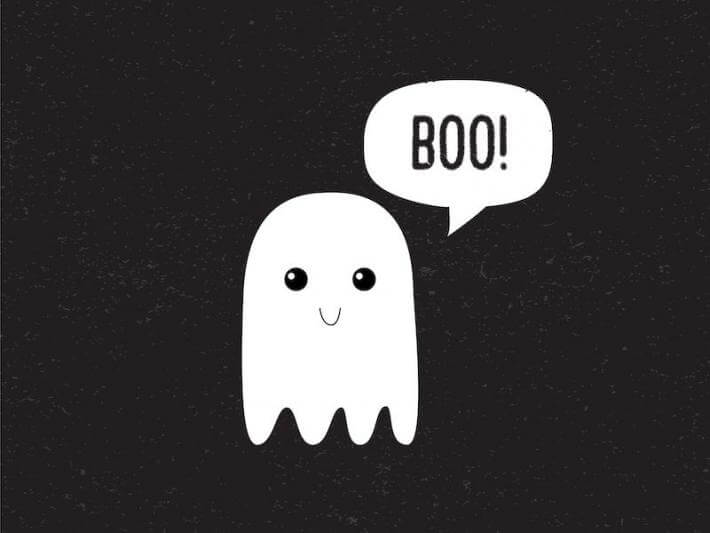10 Ghastly Words for Ghosts
People from different cultures have devised all kinds of creative names for ghosts. Often the names relate to the specific kind of spirit being described, whether it’s a noisy poltergeist or a wailing banshee.
Samantha Enslen, Writing for

Listen
10 Ghastly Words for Ghosts
Today is Halloween: the day many people celebrate all things spooky, spectral, and scary. And what’s scarier than a ghost? With that in mind, today we’re going to talk about all the words we use to describe ghosts.
Let’s start with one that’s also a favorite movie from the 1980s: “poltergeist.”
Poltergeist
This word was borrowed into English from German in the mid-1800s. It’s a mashup of the word “polter,” which means to make a loud noise, or to rumble and thud — and the word “geist,” which means a ghost or spirit. In other words, a poltergeist is a really noisy ghost, one that’s often more interested in annoying its victims than hurting them.
A related word is “zeitgeist.” This refers to the unique flavor of a certain time like the counter-culture mood of the 1960s. The word is another mashup using “geist,” although here it refers more to a spirit than a ghost per se. “Zeit” means “time,” so “zeitgeist” literally means “time spirit”— that is, the spirit or mood of a particular era.
Ghoul
Let’s move on to the word “ghoul.” I had always thought this was a general word referring to any old ghost. But apparently it’s a lot more specific.
It comes from the word Arabic “ghūl.” Its root means “to seize.” And in Muslim countries, a ghul is an evil spirit that seizes things — specifically, human corpses from graves. Then, it eats them.
I’ll never underestimate what a ghoul is again.
Banshee, Fetch, Kelpie, Wraith, and Bogle
Irish and Scottish cultures have several interesting words for ghosts. There’s the Irish “banshee,” a female spirit whose wailing sends a warning that death is on the way. It comes from the Old Irish “ben side,” meaning “a woman of the fairies.” The famous cry of this spirit is where we get the phrase “howling like a banshee.”
There’s also the Irish “fetch,” the wraith or double of a living person; it’s the equivalent of the German “doppelganger.” Supposedly, if you see your fetch in the morning, you’ll have a long, happy life. If you see it in the evening, death is soon to come.
In Scotland, there’s the ”kelpie,” “wraith,” and “bogle.” All three words are distinctly Scottish but have murky origins.
A kelpie is a water-spirit or water-demon. They can take on various shapes, but they are said to usually look like a horse. They haunt lakes and rivers, and they like nothing better than to lure people into the water and watch them drown.
A wraith is another type of water-spirit, but it can also refer to any sort of phantom or ghost.
The bogle is a sort of goblin or mischievous fairy. The word may have come from the Welsh word “bwg,” meaning a ghost, bugbear, or hobgoblin.
“Bogle” has spawned lots of related terms since it first appeared in the 1500s. There’s “boggard” and “boogeyman,” referring to types of goblins or ghosts. There’s “boggle,” meaning to overwhelm with amazement or fright. And there’s “bogey,” a name for enemy planes used in World War II.
Phantom, Apparition, and Eidolon
Next, we’ll talk about three words with very old histories: “phantom,” “apparition,” and “eidolon.”
“Phantom” (and the variation “phantasm”) can be traced all the way back to ancient Greece, to a word that meant visions, dreams, or ghosts. Its root, logically enough, meant “to make visible.”
“Apparition” has a similar root; it comes from the Latin “appārēre,” meaning “to appear.” The word “apparition” once meant anything that became visible, but now it means something that becomes unexpectedly visible, like a ghost.
It was first seen in print in Shakespeare’s “Julius Caesar,” when the ghost of Caesar appears to Brutus late at night.
BRUTUS
How ill this taper burns! Ha! Who comes here?
I think it is the weakness of mine eyes
That shapes this monstrous apparition …
Speak to me what thou art.
GHOST
Thy evil spirit, Brutus.
Finally, there’s “eidolon,” a mostly obsolete term for a ghost. It comes from a Greek word referring to a specter or phantom. Over time, the word evolved from meaning a ghostly image, to meaning a mental image, to meaning a material image or statue. It finally became the word “idol,” referring to the image of a false God in Jewish and Christian teaching.
A lovely use of the word “eidolon” can be found in Edgar Allen Poe’s poem “Dreamland.” (The capitalization is Poe’s.)
By a route obscure and lonely,
Haunted by ill angels only,
Where an Eidolon, named NIGHT,
On a black throne reigns upright,
I have reached these lands but newly
From an ultimate dim Thule—
From a wild weird clime that lieth, sublime,
Out of SPACE—Out of TIME.
And that wraps up ghosts for today. Happy Halloween, everyone.
Image courtesy of Shutterstock.
Samantha Enslen runs Dragonfly Editorial. You can find her at dragonflyeditorial.com or @DragonflyEdit.
